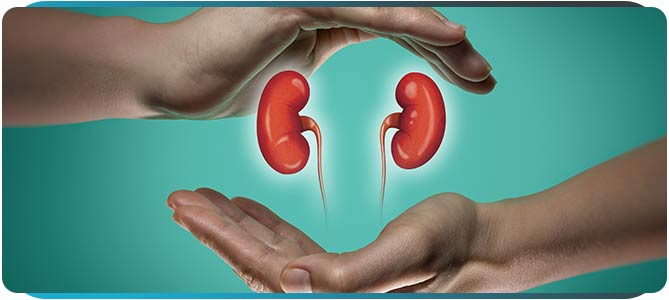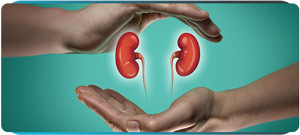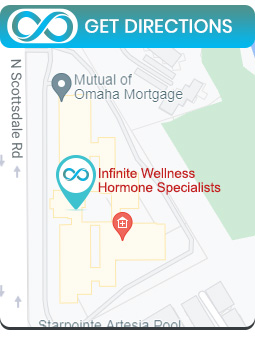Adrenal Doctor in Scottsdale, AZ
If you’re constantly exhausted, experts say part of the solution could involve nurturing your adrenal health. Learn more about adrenal health and how to improve it by visiting us at Infinite Wellness Hormone Specialists Clinic. Get specialized and comprehensive care from Dr. Vanessa Mack (Dean). For more information, contact us today or schedule an appointment online. Our clinic is conveniently located at 7373 N Scottsdale Road, Suite B270, Scottsdale, AZ 85253.


Table of Contents:
What is adrenal health?
What are the signs of adrenal gland problems?
How long does it take adrenal glands to heal?
The adrenal glands are triangular-shaped glands that sit on top of each kidney and produce hormones that help to regulate metabolism, the immune system, blood pressure, the response to stress, and other crucial functions. They have two parts — the cortex and the medulla — each of which is responsible for producing different hormones. The adrenal cortex, or outer part of the gland, produces cortisol, aldosterone, DHEA, and androgenic steroids; the medulla, or inner part of the gland, produces epinephrine (adrenaline) and norepinephrine (noradrenaline).
Adrenal health refers to the health and functionality of the adrenal glands. The term “adrenal fatigue” is sometimes used to explain symptoms that occur in people who experience long-term mental, emotional, or physical stress. Symptoms can include fatigue, trouble falling asleep at night or waking up in the morning, sugar and salt cravings, and needing copious amounts of coffee to get through the day.
The two common ways in which adrenal glands cause health problems are by producing either too much or too little of a certain hormone. These imbalances can be caused by various disorders of the adrenal glands or the pituitary gland.
Cushing’s syndrome is a result of the overproduction of cortisol by the adrenal glands. Symptoms may include:
• Weight gain and accumulations of fat in certain areas of the body, such as the face, below the back of the neck called a buffalo hump and in the abdomen
• Thinning arms and legs
• Purple stretch marks on the abdomen
• Facial hair
• Fatigue
• Muscle weakness
• Easily bruised skin
• High blood pressure
• Diabetes
And other health issues
Cushing’s Disease is a result of excess cortisol production caused by overproduction of ACTH by a benign tumor in the pituitary gland or a tumor elsewhere in the body. Another common cause of Cushing’s syndrome is excessive and long-term use of external steroids, such as prednisone or dexamethasone, which are prescribed to treat many auto-immune or inflammatory diseases such as rheumatoid arthritis, lupus, inflammatory bowel disease (IBS), asthma, or multiple sclerosis.
Adrenal insufficiency is a rare disorder and is classified as primary adrenal insufficiency (Addison’s disease) caused by disease of the adrenal glands or secondary adrenal insufficiency caused by diseases in the hypothalamus or the pituitary gland. It is the opposite of Cushing’s syndrome and is characterized by low levels of adrenal hormones. The symptoms include:
• Weight loss
• Poor appetite
• Nausea and vomiting
• Fatigue, darkening of the skin (primary adrenal insufficiency)
• Abdominal pain
The causes of adrenal insufficiency may include autoimmune disorders, fungal or other infections, cancer (rarely), and genetics. Although adrenal insufficiency usually develops over time, it can also appear suddenly as an acute adrenal failure (adrenal crisis) which has similar symptoms to primary adrenal insufficiency, but the consequences are more serious and can lead to life-threatening shock, seizures, and coma.
Congenital adrenal hyperplasia (CAH) is a disorder that children are born with. They are missing an essential enzyme necessary for the production of cortisol, aldosterone, or both and often experience early puberty. Depending on the severity of the deficiency, congenital adrenal hyperplasia can remain undiagnosed for years. In more severe cases, infants may suffer from indistinct genitalia, dehydration, vomiting, and failure to thrive.
Overactive adrenal glands are the result of nodules producing too much of a certain hormone. Both benign and cancerous nodules may produce excessive amounts of certain hormones; nodules greater than 4 centimeters should have a further evaluation with a view to surgical removal.
Hyperaldosteronism is caused by an overproduction of aldosterone from either one or both adrenal glands and is characterized by an increase in blood pressure that often requires various medications to control. Some people can also develop low potassium levels in the blood, which can cause muscle aches, weakness, and spasms.
Pheochromocytoma is a tumor to which some people are genetically predisposed which results in an excess of adrenaline or noradrenaline by the adrenal medulla. They may cause persistent or sporadic high blood pressure that can be difficult to control with regular medication. Other symptoms include headaches, tremors, sweating, anxiety, and rapid heartbeat.
Adrenal cancer such as adrenocortical carcinoma is rare and by the time it is diagnosed has often spread to other organs and tissues. They can grow fairly large and can reach several inches in diameter. Cancerous adrenal tumors can release excesses of one or more hormones which result in the symptoms listed above. Patients may also experience abdominal pain, flank pain, or feeling bloated, especially when the adrenal tumor gets very large. The majority of malignant adrenal tumors are the result of cancer spreading from a primary tumor elsewhere in the body.
This will depend on what is causing the disorder, as different conditions will take different lengths of time to heal. An estimate would be:
• Cushing’s syndrome – 2-18 months
• Adrenal insufficiency – 6-12 months
• Congenital adrenal hyperplasia – in some cases can be a lifelong condition
• Hyperaldosteronism – varies depending on cause and severity
• Pheochromocytoma – can be fatal if left untreated
• Adrenal cancer – will vary depending on the stage of cancer.
If you would like to know more about adrenal health, contact Infinite Wellness Hormone Specialists today! We serve patients from Scottsdale AZ, Tempe AZ, Mesa AZ, Paradise Valley AZ, Chandler AZ, Phoenix AZ, and BEYOND!

Additional Services You May Need
▸ Hormone Pellet
▸ Women’s Hormone Therapy
▸ Men’s Hormone Therapy
▸ Semaglutide Injections
▸ Women’s Intimate Health
▸ Body Contouring
▸ Thyroid Conditions
▸ Adrenal Health
▸ Menopause
▸ Medical Weight Loss
▸ Contour Light
▸ Morpheus 8

Additional Services You May Need
▸ Hormone Pellet
▸ Women’s Hormone Therapy
▸ Men’s Hormone Therapy
▸ Semaglutide Injections
▸ Women’s Intimate Health
▸ Body Contouring
▸ Thyroid Conditions
▸ Adrenal Health
▸ Menopause
▸ Medical Weight Loss
▸ Contour Light
▸ Morpheus 8








